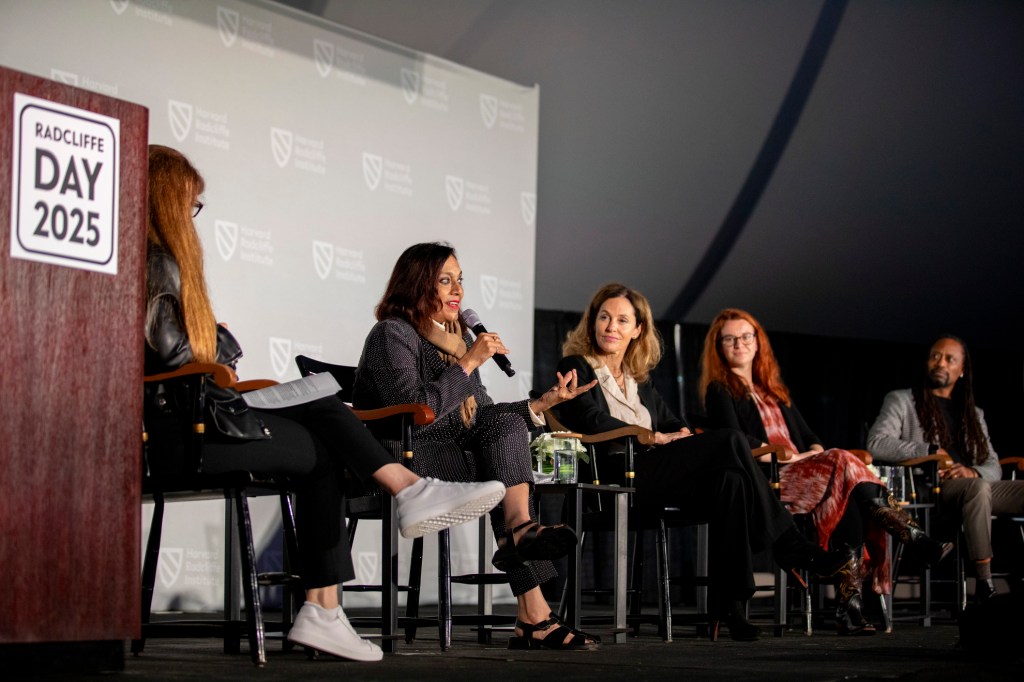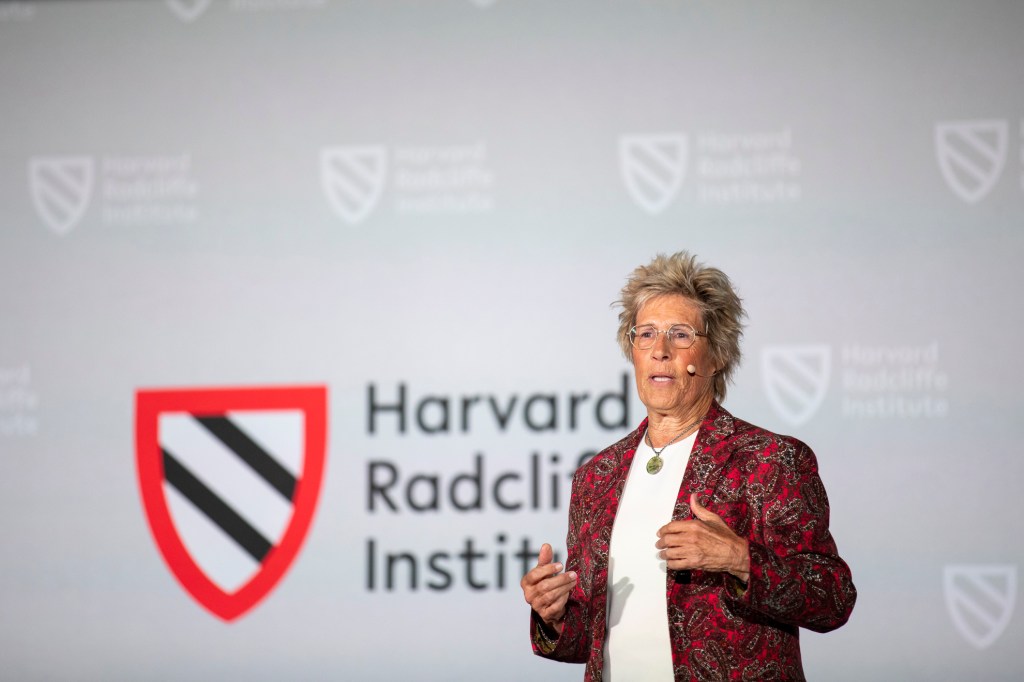Jodie Foster always thought she’d become a writer.
“I didn’t really think I wanted to be an actor when I grew up because it seemed like kind of a dumb job,” the Academy Award-winning actor and filmmaker said during a Radcliffe Day event Friday with Henry Louis Gates Jr., Alphonse Fletcher University Professor and director of the Hutchins Center for African and African American Research.
Acting seemed too superficial to be intellectually satisfying as a career, she said. But then, Robert De Niro took her under his wing and worked with her on improvisation skills while the two starred in “Taxi Driver.” DeNiro was the lead in the 1976 Oscar winner, and Foster played a young sex worker, a role for which she received her first Academy Award nomination.
“My 12-year-old mind was blown. I suddenly understood that acting was more than just saying lines and ‘being yourself,’” she told Gates, who was Foster’s thesis adviser at Yale in the early 1980s. “I hadn’t looked at it the way I might look at a book or the way I might look at a painting. I hadn’t really looked at it as an art form, and … It was up to me to challenge myself to go beyond that.”
Foster was on hand at the Harvard Radcliffe Institute to receive the 2025 Radcliffe Medal, presented by Dean Tomiko Brown-Nagin, for her accomplishments over a six-decade career as an actor and filmmaker, and her advocacy for suicide prevention among LGBT youth.
As part of the annual Radcliffe Day celebration, Foster spoke about her evolution from 1970s Disney child star to celebrated filmmaker and two-time Academy Award winner for leading roles in “The Accused” (1988) and “Silence of the Lambs” (1991).
Famously private, Foster delved into the trauma she experienced as an 18-year-old Yale freshman after a stalker shot President Ronald Reagan in 1981 in a bid to win her favor. She was forced into hiding, couldn’t live on campus or attend classes anymore, and needed round-the-clock security.
The ordeal was, she said, “a trial by fire. I became adult really quickly” and learned some good life lessons about the value of community and also some bad ones, like “now you can trust no one.”
Foster said she deliberately avoided talking about the experience for decades.
“I wanted to have a long career where I was known for myself and for my work, and I wanted my identity to be about what I produced,” she explained to Gates. “I just didn’t want to be ‘that girl’ who was chosen abstractly by an insane man to be a footnote in history.”
“I wanted to have a long career where I was known for myself and for my work, and I wanted my identity to be about what I produced.”
Foster also talked about being a mother and of the complicated relationship she had with her own. Brandy Foster, a single mother of four, pushed her daughter into acting and modeling at age 3 and managed her career for many years, steering her toward many films that achieved critical and commercial success.
“Because of her generation and her status [as a] pre-feminist woman, she wanted me to be respected above anything else, and so she engineered, in some ways propelled me in, a career where she could feel respected because her daughter was respected,” she said. “That was a big burden and a big responsibility.”
Diana Nyad, the record-breaking endurance swimmer who inspired “Nyad,” the 2023 biopic for which Foster earned her fifth Oscar nomination, spoke about Foster’s meticulousness as an actor and her status as a somewhat reluctant lesbian icon.


Foster said she feels proud that people say she helped facilitate greater acceptance of LGBTQ people in the film industry, but she wishes she “could have done more” to be an outspoken leader.
“My No. 1 concern … was surviving intact, emotionally and intellectually,” she said. “What I didn’t want to do was end up dead in a hotel room with a needle in my arm.” Accomplishing that required “a kind of emotional safety and privacy that was unusual for the film business” then and perhaps more so now.
“I don’t think I would have survived it intact” if she’d been a young actor now, Foster said. “But in those days, the way to survive that was to say, ‘I am off limits. You can’t have me. You can have all this part that I give you. You can have my art… You can count on me, but you can’t have all of me.”
Earlier in the day, actor Amy Brenneman ’86, acclaimed filmmaker Mira Nair ’79, Naomi McDougall Jones, an advocate for gender parity in film industry, and television showrunner Saladin K. Patterson spoke with Stacy L. Smith, a professor of communication at the University of Southern California’s Annenberg School of Communication and Journalism, about how underrepresented women remain in the film and television industry the obstacles that still need to be overcome both in front of and behind the camera, despite societal gains.
Since 1987, the Harvard Radcliffe Institute each year has recognized outstanding women who have made a lasting impact on the world. Past recipients include Supreme Court Justices Sonia Sotomayor and Ruth Bader Ginsburg, labor activist Dolores Huerta, former Secretary of State and New York Senator Hillary Clinton, and Nobel Prize winning author Toni Morrison.
Source link

